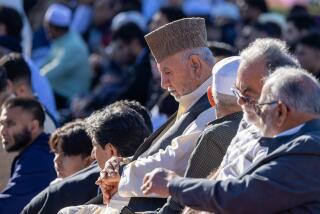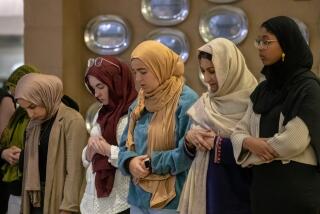Ramadan fast survival guide will help you stay fit and healthy
We’re about halfway through the Islamic holy month of Ramadan. This is the time of year when an estimated 1.6 billion Muslims worldwide abstain from eating, drinking, smoking and sex during daylight hours. That’s right -- we give up food, water, coffee and even cronuts from sunup to sundown to commemorate God’s revelation of Islam’s holy book, the Koran, to the Prophet Muhammad. Instead of spending afternoons with friends at Starbucks, Muslims focus on achieving self-discipline and reflection, while feeling the plight of those less fortunate.
I’ve been fasting since I was 9 years old. I’ve experienced relatively easy fasts in the short days of November and December, and 16-hour fasts in the long, sweltering days of July.
This year, the lunar calendar brought us another Ramadan of marathon fasts. I decided it was a good reason to get some professional help to get through it with the best chance that my skinny jeans would still fit when the monthlong observance was over.
I reached out to Alyse Levine, founder of the Los Angeles-based nutrition consulting practice Nutritionbite, for some advice on what to eat instead of the traditional South Asian fast-breaking treats of flaky, fried potato samosas and oil-slicked pakoras with a side of mint chutney. She recommended green, grainy and protein-rich menu options to keep blood sugar levels from swinging drastically post-fast, and to remain satiated longer. Levine suggested whole grains and high-fiber foods full of protein, such as wheat breads, lentils and beans. She also endorsed foods containing healthy fats, including nuts, eggs and yogurt.
Though it’s tempting to gorge on anything edible in sight once the sun sets, Levine urged me to resist and explained that I’d be better off if I slowed down the fast-breaking food consumption. About the worst thing a faster can do is overdose on refined carbohydrates and refined sweets at nighttime.
“It takes about 20 minutes for a signal to go from your stomach or your G.I. tract to your brain to tell you you’re full,” she said. “So if you eat very quickly, you’re much more likely to overdo it right when you break fast.” The same goes for the pre-dawn meal, when Levine says fasters should be gulping water instead of coffee to remain hydrated throughout the day.
Levine said fasters should “ease into” an eventual meal by breaking their fast with dates and water, milk or watered down fruit juice, before moving on to a light starter such as a broth-based soup and crackers meal. “Then, you can have a healthy and balanced meal including a protein, vegetable and ideally whole grain side,” while continuing to rehydrate your body with water.
Working in some exercise is the next step to a healthy and enriching Ramadan. The thought of sweating out my body’s precious drops of water makes it hard to even consider a normal gym routine. Luckily, Los Angeles-based sports nutritionist and celebrity fitness expert Rehan Jalali says 20 minutes of exercise is actually all you need.
“Cut cardio down to a minimum during Ramadan” and opt for resistance training instead, focusing on compact movements, he advised. Jalali recommends leg and arm strengthening exercises like lunges paired with side-lifting dumbbells shoulder-high, while kicking core abdominal muscles in gear with three sets of lying-floor and side-crunches (15-30 reps each). Also, three sets of lying leg raises with a toe touch (10-20 reps) concentrate on the lower and upper abs (see video above for demo).
Timing matters too. “The best time to work out is at nighttime during Ramadan, or before the pre-dawn meal” when your body is well-hydrated, Jalali explained.
Exercising while fasting can reduce metabolism and break down muscle tissue, he said. To counteract this, he recommends fasters take fish oil and Vitamin C and D in addition to a daily multi-mineral each morning during the pre-dawn meal.
Even among observant Muslims, fasting isn’t for everyone. People with certain conditions that require medication, like diabetes, can opt out of fasting, as can pregnant and breastfeeding women, patients with chronic kidney disease, and those who have suffered from heart failure, among others.
Dr. Tipu Khan of South L.A.’s UMMA Community Clinic, which has provided free and low-cost healthcare for more than 15 years and is rooted in Islamic tenets, recommended that Muslims talk with their doctors before embarking on any sort of fast, to ensure it is done in the safest way possible. He also noted that the psychological effects of fasting may be more difficult for many people to deal with than physically being without food and drink.
Though I can’t say I’ve adhered to all of the pro-health tips I received from the experts, I usually eat whole grains, nuts, fruit, coconut water and a multivitamin in my pre-dawn meal. I also take it slow when I break my fast, starting with two dates and a glass of water, before moving on to a kale salad or sautéed vegetable medley paired with a lean protein.
When the nightly cronut cravings hit, I toss mango and strawberry bits on a small bowl of greek yogurt, topped with shredded almonds. Remarkably, I’ve only consumed about four cups of coffee so far (how’s that for self-discipline!), and my caffeine headaches have eased. I plan to power through the remainder of Ramadan with the “more green-more lean-skinny jeans” methodology -- with some traditional samosa treats sprinkled in for good measure.
Return to Science Now.







